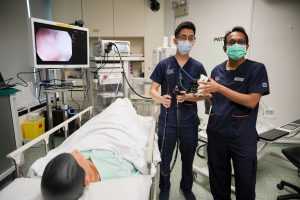Cancer remains a formidable health challenge in the Philippines, characterised by high mortality rates and delayed diagnoses.
The country has embarked on an innovative strategy to combat this pressing issue, enlisting businesses to conduct early screenings for millions of workplace workers. This article delves into the multifaceted approach the government and private sector adopted to enhance cancer prevention and control efforts.
Government-Private Sector Partnership
The Philippine government pivoted last year by partnering with the private sector. This was done after recognising the critical importance of early detection in improving cancer survival rates. This collaborative endeavour aims to expand accessibility to cancer screening services, particularly for individuals facing financial and logistical barriers. In September, a landmark mandate was issued. It compelled all employers to establish comprehensive cancer prevention and control programs within their organisations. This directive represents a paradigm shift in healthcare delivery, emphasising the shared responsibility between the government and the private sector in addressing public health challenges.
Cervical Screening Initiative For Workplace
Central to this initiative is the cervical cancer screening program, which serves as a flagship initiative in the broader campaign against cancer. Since its inception, hundreds of Filipinos, including Gemma Remojo, an office worker at Home Credit, have benefited from free Human Papillomavirus (HPV) screenings provided by their employers. In collaboration with the Johns Hopkins Program for International Education in Gynecology and Obstetrics (Jhpiego), Home Credit pioneered this initiative. The initiative distributes explicitly screening kits to employees and ensures confidentiality in the testing process. Such initiatives promote early detection and empower individuals to take proactive steps toward managing their health.
Healthcare Accessibility and Affordability
A significant driving force behind the uptake of cancer screening services is cost reduction and improved affordability. Studies have highlighted the staggering financial burden faced by Filipino cancer patients, encompassing medical expenses, out-of-pocket costs, and lost wages. The prohibitive cost of screening and treatment often deters individuals, particularly those from marginalised communities, from seeking preventive care. By integrating cancer screening into workplace health programs, the Philippines aims to bridge the gap in healthcare access and alleviate the financial burden on employees.
Challenges and Solutions
Despite the commendable efforts to expand cancer screening services, challenges persist in the program’s implementation and uptake. Nadia de Leon from the Institute for Occupational Health and Safety Development underscores the importance of stringent enforcement and monitoring mechanisms. She stressed this to ensure compliance with screening mandates. Additionally, logistical hurdles, particularly in factory settings and special economic zones, pose challenges to program scalability. To address these obstacles, collaborative partnerships between the private sector, community-based organisations, and local governments are essential in overcoming barriers to screening access.
Towards Comprehensive Cancer Screening
While the cervical screening initiative marks a significant milestone, the Philippines aims to broaden its cancer screening efforts to encompass breast and colon cancer, which also pose significant threats to public health. Businesses can play a pivotal role in promoting early detection and improving health outcomes for their employees. By leveraging existing infrastructure and resources, the Philippines seeks to establish a robust ecosystem of preventive healthcare that addresses the diverse needs of its population.
Grassroots Engagement and Outreach
To ensure equitable access to screening services, grassroots engagement and community outreach are essential. Community-based organisations serve as catalysts for raising awareness, facilitating screenings, and supporting underserved populations. The Philippines endeavours to democratise access to cancer screening and foster a culture of proactive healthcare management. This is made possible by empowering communities with this knowledge and resources.
Towards a Healthier Future
The Philippines’ approach to cancer screening represents a significant stride towards mitigating the burden of the disease. The nation seeks to establish a comprehensive framework for cancer prevention and control. However, sustained commitment, robust enforcement mechanisms, and collaborative endeavours are essential to ensuring the program’s effectiveness and accessibility to all segments of society. Through inclusive and holistic initiatives, the Philippines aims to pave the way for a healthier future for its citizens.6













